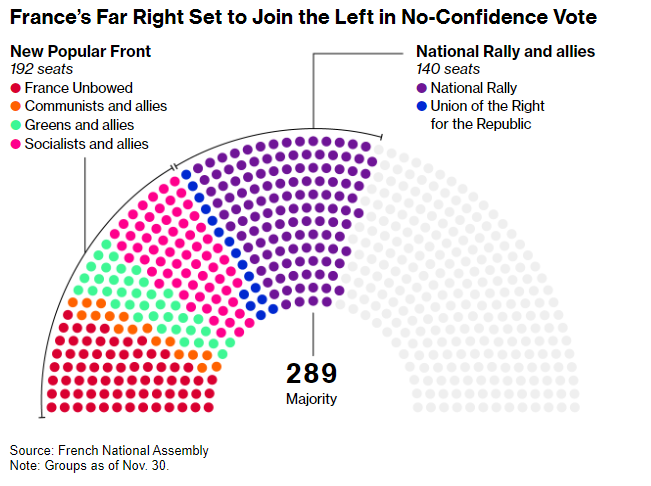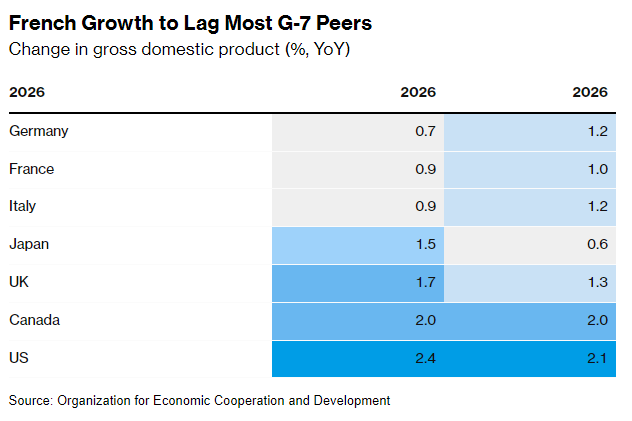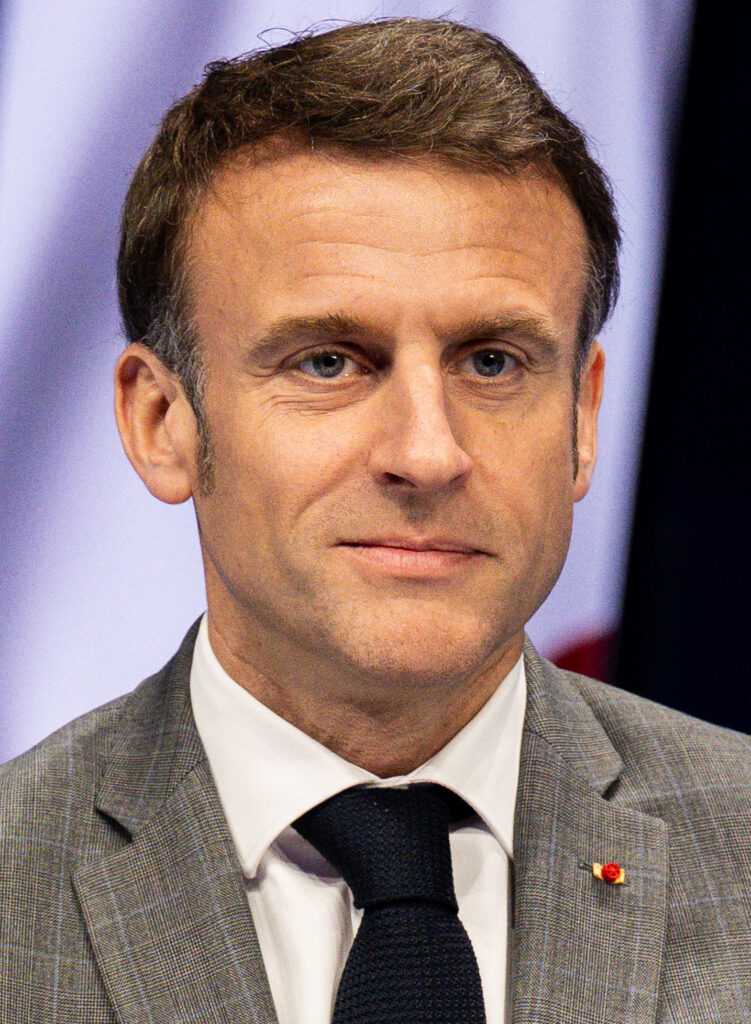December 3, 2024
President Emmanuel Macron has called on French lawmakers to put the nation’s interests above personal ambition as a crucial no-confidence vote looms, threatening to plunge the country into political turmoil.
The vote, scheduled for Wednesday, was initiated by a left-wing coalition and is expected to pass if supported by far-right leader Marine Le Pen’s National Rally party. Le Pen’s party, now the largest in the lower house of parliament following a snap election in June, has positioned itself as a key power broker in French politics.
During a trip to Saudi Arabia, Macron expressed confidence that lawmakers would act responsibly. “The only question politicians must ask themselves today is how to serve the nation and the French people—not their personal ambitions,” Macron said. He described the potential support for the no-confidence motion from Le Pen’s party as “a vote of unbearable cynicism.”
Prime Minister Michel Barnier echoed Macron’s sentiments, expressing hope that lawmakers would act in the country’s best interest. “I believe in a reflex of responsibility,” Barnier said in a televised interview. “The higher national interest should prevail.”
The National Rally has pledged its support for the motion, with its leader, Jordan Bardella, criticizing Macron’s government as disconnected from the struggles of ordinary citizens. “Their comments show they are completely out of touch with the reality of the French people’s suffering,” Bardella said on France Inter radio.
Lawmakers in Paris will begin debating the motion at 4 p.m. on Wednesday, with voting set to follow. If the motion succeeds, it would mark a significant shift in France’s political landscape and could lead to the collapse of the current government.

The political difficulties began after President Emmanuel Macron called snap elections in response to a significant defeat in European elections. The results left France’s lower house fragmented into three fiercely opposed blocs: a diminished centrist faction supporting the president, a leftist alliance, and an emboldened far-right led by Marine Le Pen. With no coalition viable, Macron appointed Michel Barnier as prime minister in September, tasking him with the critical mission of addressing France’s mounting financial woes.
On Monday, Barnier invoked a constitutional mechanism to push through an unpopular budget bill, bypassing parliamentary approval. This decision triggered outrage from the opposition, leading both the National Rally and the leftist coalition to file motions for no-confidence votes. Le Pen moved forward with the motion even though Barnier had conceded to nearly all of her party’s demands to amend the budget legislation.
If the government collapses during Wednesday’s vote, it would cement Le Pen’s rise as a pivotal force in French politics and highlight the fragile state of Macron’s leadership. It would also mark the shortest tenure for a prime minister since the founding of France’s Fifth Republic in 1958.
The political uncertainty has had tangible economic consequences. Bond investors have responded by penalizing France’s sovereign debt relative to its peers, pushing borrowing costs last week to levels comparable to Greece’s. Barnier warned of a potential “storm” in financial markets if his government is ousted.
These challenges come as France attempts to implement fiscal reforms to address its unwieldy deficit. Barnier’s proposed budget initially included €60 billion ($63.1 billion) in tax increases and spending cuts, aiming to reduce the deficit to 5% of GDP by 2025 from an estimated 6.1% this year. However, opposition to these measures has further complicated their implementation.
The Organisation for Economic Co-operation and Development (OECD) forecasts modest economic growth for France, with projections of just 0.9% in 2025 and 1% in 2026. It has warned that even with the adoption of the current budget, additional measures will be “vital to reduce government debt significantly.” The OECD further cautioned that “weaker-than-expected inflation and economic growth could reduce tax revenues, threatening the government’s ability to meet its deficit targets.”
As the clock ticks toward the no-confidence vote, the outcome could have profound implications for France’s political and economic trajectory, potentially reshaping the nation’s leadership and financial stability.

A government collapse at the close of the year would plunge France into uncharted territory, creating both political and economic uncertainty. The outgoing administration, operating in a caretaker capacity, could invoke emergency laws to collect taxes and ensure a minimal level of essential spending. However, the broader economic and financial ramifications of such a scenario are difficult to predict.
Finance Minister Antoine Armand cautioned earlier on Tuesday that stopgap measures would result in higher taxes for millions of households while freezing planned spending increases for critical areas such as security and agriculture.
What Happens If the Government Collapses?
Resignation of the Government
Prime Minister Michel Barnier would formally tender his resignation, marking the official dissolution of the administration.Caretaker Cabinet with Limited Powers
The outgoing cabinet would remain in place with restricted powers, solely managing current affairs to ensure the government continues to function at a basic level.Presidential Appointment of a New Prime Minister
President Emmanuel Macron would be tasked with appointing a new premier. There is no constitutional deadline for this decision, leaving the timeline uncertain.Emergency Legislation to Avert a Shutdown
The caretaker government would likely rely on untested emergency measures to maintain minimal spending and tax collection needed to prevent a fiscal shutdown.Formation of a New Government
Once a new prime minister is appointed, they would need to propose a cabinet for the president’s approval and present a revised 2025 budget to parliament for consideration.Restrictions on Legislative Elections
A new legislative election is constitutionally barred until July, leaving the current fractured parliament to navigate the crisis.
Macron’s Position
While opposition voices, particularly from the left, have called on Macron to resign, the president has firmly stated his intention to complete his full term. Macron cannot be forced out of office, with the next presidential election scheduled for 2027. Current polls suggest Marine Le Pen remains the frontrunner for the presidency.
“I’ve been elected twice by the French people, and I’m extremely proud of that,” Macron said. “I’ll honor that trust with all my energy, right up to the last second, to be useful to the country.”
This unprecedented political turmoil threatens to deepen France’s economic challenges and strain its fragile parliamentary alliances, leaving the country at a crossroads as it grapples with a potential government reset.

